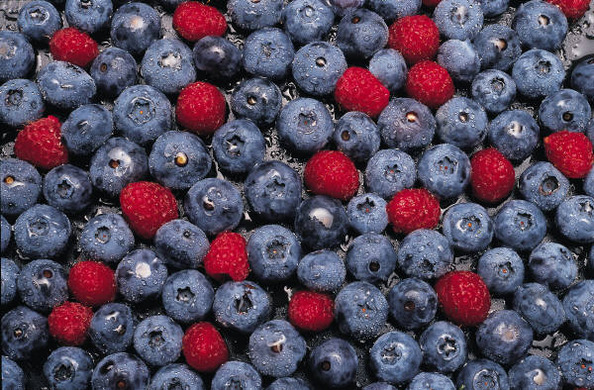Foods that Fight Dementia
30 Mar 2013
You are what you eat, and that’s doubly true for keeping your mind sharp well into your 60s and beyond.
By Edna Cox Rice, RD, CSG, LD
Want to know how to avoid dementia? Just change your diet! Science is substantiating what many of us already know – that diet can prevent disease. Certain compounds such as antioxidants, flavonoids, polyphenols, and omega-3s found in a variety of foods and spices may help to protect people from Alzheimer’s disease and other related dementia.
Alzheimer’s disease is the most common cause of dementia in people aged 65 and older. Once thought to be an inevitable part of the aging process, numerous studies suggest that dietary interventions protect against mental decline. The cause of dementia is related to long – term inflammation in the body. Certain foods possess anti-inflammatory effects and may be able to delay cognitive disorders when included in the diet on a consistent basis. These foods containing antioxidants and other beneficial chemicals help to slow inflammation and the oxidative process. The most promising foods to fight dementia are discussed here.
Berries, Cherries, & More: Fruits, especially blueberries, are packed with antioxidants, flavonoids and plentiful amounts of Vitamin C and Vitamin E. Antioxidants remove free radicals from the blood; these chemicals potentially cause cell and tissue damage. Flavonoids which are plant pigments that help to increase blood flow to the brain and protect healthy cells.
A bowl of blueberries may increase attention span, and increase concentration by 20% throughout the day.
Cherries contain antioxidant compounds, anthocyanins, which give cherries their bright color. They possess anti-inflammatory properties that could work like pain medications such as Vioxx and Celebrex without the side effects. Cherries do not irritate the stomach like most anti-inflammatory medications or NSAIDS.
Choose blueberries, raspberries, strawberries, or cherries daily for the protective flavonoid properties.
Cruciferous Vegetables: Are rich in carotenoids and folate. These compounds lower levels of homocysteine, an amino acid linked to cognitive impairment. Broccoli, cauliflower, Brussels sprouts, kale, bok choy, greens, spinach and arugula help to ward off depression, often a symptom of dementia.
A 2008 study found that people with folate deficiencies were 3.5 times more likely to develop dementia. To make sure you eat sufficient folate, include one or more of these vegetables several times a week.
A large study of older adults found that those who ate fruits and vegetables daily reduced their risk of dementia 30% more than those who didn’t routinely eat fruits and vegetables.
A good rule of thumb – the more colorful a fruit or vegetable, the higher the flavonoid level.
Fish: According to study conducted by Tufts University in Boston, individuals who consumed an average of three servings of oily fish a week had almost 50% lower risk of Dementia and Alzheimer’s disease. This was attributed to higher levels of omega-3 fatty acid levels in the blood.
Omega-3 fatty acids are highly concentrated in the brain. The American Journal of Clinical Nutrition reports that low dietary intake of omega-3s are associated with increased incidence of dementia.
Wild caught salmon, frozen or canned, generally contains more omega-3s, less omega-6s and fewer toxins. Try to incorporate 2 – 3 servings of oily fish weekly. Anchovies, sardines, halibut and mackerel are also rich sources of omega-3 fatty acids.
Due to water pollution, many fish contain high levels of toxins and heavy metals such as mercury and PCB’s which affect the brain. It is recommended to limit or avoid completely swordfish, tilefish, shark and snapper.
Nuts: A small, handful of nuts provides omega-3s, omega 6 fatty acids, Vitamin E, folate, and magnesium. Vitamin B6 nutrients protect against age-related memory loss and work to improve mood. All varieties of nuts – walnuts, almonds, pecans, hazelnuts and cashews – offer these benefits.
Spices: Certain spices add antioxidants and memory boosting compounds. Spices like cinnamon enhance cognitive processing.
Curcumin, a main ingredient in turmeric, is beneficial with memory problems. Cinnamon, cloves, ginger and lemon balm have antioxidant and memory boosting properties.
Dark Chocolate: Norwegian researchers found that flavonoids in cocoa increase blood flow to the brain and protect against dementia. The darker the chocolate the better for you, since you’ll be getting less sugar and more flavonoids. To get the most benefit, buy chocolates with 70% or higher cocoa content.
Red Wine: A number of studies report that moderate consumption – defined as 1 drink or less per day for women and 1-2 drinks or less per day for men – may help reduce the risk of developing dementia. Red wine contains a polyphenol, resveratrol, has been shown to significantly reduce cognitive deterioration.
Alcohol is a double-edged sword that should be used cautiously. Evidence suggests that excessive alcohol intake can have a negative effect on the brain and lead to dementia. If you do drink, do so in moderation and choose red wine over other types of alcohol. If you are a non-drinker there’s no reason to start the habit now.
Remember the sage advice of Hippocrates: “Our food should be our medicine. Our medicine should be our food.” The nutrients found in food not only feed your body, they also feed your brain.













